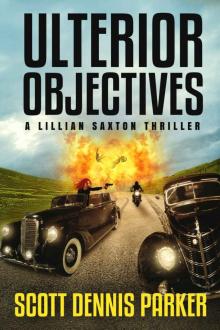- Home
- Scott Dennis Parker
Ulterior Objectives: A Lillian Saxton Thriller
Ulterior Objectives: A Lillian Saxton Thriller Read online
Ulterior Objectives
A Lillian Saxton Thriller
By
Scott Dennis Parker
Quadrant Fiction Studio
Houston
2016
Ulterior Objectives
A Lillian Saxton Thriller
By Scott Dennis Parker
Copyright © 2016 by Scott Dennis Parker
A Quadrant Fiction Studio Book
(QFS-004)
Cover Concept by
Scott Dennis Parker
Cover Design by
B&J
www.quadrantfictionstudio.com
All rights reserved.
This is a work of fiction. The characters, incidents, and dialogues are products of the author’s imagination and are not to be construed as real.
No part of this book may be used or reproduced in any manner whatsoever without written permission of the Publisher or Author, except in the case of brief quotations embodied in critical articles and reviews.
Monthly Newsletter
Sign up for the newsletter and get a free copy of WADING INTO WAR: A Benjamin Wade Mystery. Plus you’ll receive exclusive sneak peeks at upcoming titles, behind-the-scenes of the book making process, and more.
Sign Up Now!
To Dad,
who helped me envision this story
from the beginning
Table of Contents
Table of Contents
CHAPTER 1
CHAPTER 2
CHAPTER 3
CHAPTER 4
CHAPTER 5
CHAPTER 6
CHAPTER 7
CHAPTER 8
CHAPTER 9
CHAPTER 10
CHAPTER 11
CHAPTER 12
CHAPTER 13
CHAPTER 14
CHAPTER 15
CHAPTER 16
CHAPTER 17
CHAPTER 18
CHAPTER 19
CHAPTER 20
CHAPTER 21
CHAPTER 22
CHAPTER 23
CHAPTER 24
CHAPTER 25
CHAPTER 26
CHAPTER 27
CHAPTER 28
CHAPTER 29
CHAPTER 30
CHAPTER 31
CHAPTER 32
CHAPTER 33
CHAPTER 34
CHAPTER 35
CHAPTER 36
CHAPTER 37
CHAPTER 38
CHAPTER 39
CHAPTER 40
CHAPTER 41
CHAPTER 42
CHAPTER 43
CHAPTER 44
CHAPTER 45
CHAPTER 46
CHAPTER 47
CHAPTER 48
CHAPTER 49
CHAPTER 50
CHAPTER 51
CHAPTER 52
CHAPTER 53
CHAPTER 54
CHAPTER 55
CHAPTER 56
CHAPTER 57
CHAPTER 58
CHAPTER 59
CHAPTER 60
ACKNOWLEDGEMENTS
OTHER BOOKS BY SCOTT DENNIS PARKER
TRIPLE ACTION WESTERN
CALVIN CARTER
ANTHOLOGIES
ABOUT THE AUTHOR
CHAPTER 1
Tuesday, 23 April 1940
“Sergeant Saxton, what do you think of when you hear the word ‘treason’?”
Lillian Saxton stood at attention and frowned. She wore her assigned brown uniform, belted at the waist, tie neatly knotted, with a skirt that hung just at the knees. Since she was inside Houston’s Rice Hotel, her garrison cap was folded over the belt. Her red hair was pulled up behind her ears.
“I’m sorry, sir, I don’t I understand what you mean.” Her voice was curious but deferential.
“Treason, Sergeant. It’s a simple concept. What does it mean to you?”
The man who snapped at her she didn’t know, but his brown uniform displayed the rank of colonel. He stood to the side of a table in one of the upper suites of the famous Rice Hotel. The man who sat at the table, littered with stacks of paper and a typewriter, she knew. He was Captain Ernest Donnelly, her commanding officer. She looked at him for clarification.
“I’m the one speaking to you, Sergeant,” the colonel spat. “If there’s ever a situation where you think you need to look elsewhere for help, then we’ve got a bigger problem than I imagined.”
Donnelly, dressed in his brown uniform but with the tie loosened around his collar, leaned back in his chair. “Honeywell, why don’t you just…”
“Don’t tell me what I should do, Captain,” Honeywell blurted. “I’ve asked the sergeant a question. I expect an answer directly from her and not from her superior officer or anyone else she thinks can help her.”
A little fire burst into existence deep within Lillian’s gut. She hated what many of the men in the United States Army thought of her: weak, not as good as a man, only good for typing up reports. She was none of that, and she strove every day to prove wrong that kind of thinking.
“Treason,” Lillian began, speaking evenly but with force, “is the active betrayal of one’s country. In most cases, especially in war time, it is punishable by death.”
Honeywell regarded her for a moment. His short cropped hair was receding across the top of his head. The gray flecks caught the lamp light and seemed to glow.
“That is pretty much the letter of the law, Sergeant. Now, even though we’re not at war, what do you think should be done about someone who may commit treason?”
“May commit, colonel?”
A small twitch along the corner of his mouth might have grown into a smile, but Honeywell didn’t give it the chance. “Yes, Sergeant. Would you trust anyone whom you suspect of committing treason?”
Lillian pondered the question for a few heartbeats. “It would depend on the circumstances, Colonel. If the person was only suspected, I would seek out additional information, either to clear the individual or convict him.”
Another twitch, this time along Honeywell’s eyebrows. Lillian had to admire a person like the colonel who could so easily contain his outward emotions. She made a note never to play the colonel in poker although that likelihood would probably never come to pass.
“So you would investigate?”
“Yes, sir.”
“Undercover?”
“If necessary, yes.”
“What if you knew the person? Would that cloud your judgement?”
Another few heartbeats. “No, sir. This is the United States of America. All citizens, military or civilian, are assumed innocent until proven guilty. Same goes with someone suspected of treason. You investigate, gather evidence, and, if the evidence points to treason, you arrest the individual. You bring him to trial and, if he is found guilty, you inflict punishment.”
“Back to my second question: what if you knew the person? Would you hide evidence, alter testimony, or do anything to sway the arresting officer or jury?”
“No, sir. Treason is treason, and if the evidence indicates that, there is no other recourse.” She glanced to Donnelly, then back up to Honeywell. “I would, of course, be upset, but that’s a personal matter, not a military one.”
In the intervening silence, Donnelly spoke. “Well, Colonel, I think that should satisfy you.”
Honeywell narrowed his eyes. “I’ll let you know when I’m satisfied.”
“Of course.” To Lillian, Donnelly asked, “Have you contacted Wade to get his report on your brother?”
Donnelly was referring to the assignment recently completed. Samuel Saxton, Lillian’s brother, was lost in Europe. She feared the wo
rst, especially with the Nazi army threatening to strike. A reporter, Wendell Rosenblatt, had information about Samuel. He was due to land in Houston, but vanished. Lillian hired private investigator Benjamin Wade to locate Rosenblatt. He did, but it was too late. Rosenblatt was dead, but Wade found the reporter’s notes complete with all the details about Samuel’s whereabouts.
Lillian had been waiting for Wade to deliver his report when Donnelly summoned her to his room in the Rice Hotel.
“No, sir.”
Donnelly gestured with his head to the next room. “Why don’t you give him a call?”
Lillian nodded once and left the room.
***
“I think she passes your muster, Colonel,” Donnelly said.
“You’re just too close to her and the rest of your little squad.” Honeywell walked over to a bureau where a single bottle of Jack Daniels whiskey rested. He poured himself a couple of fingers and downed half in one gulp. He held the glass in his hands and mulled over something in his head. “But the communique was to her personally. Do you think Monroe is trying to recruit her?”
“Don’t be silly,” Donnelly blurted. He realized he was addressing a senior officer and stood. He poured his own glass of whiskey. “As far as I know, Frank Monroe is only an investment banker. His job takes him all over the U.S. and Europe. He has contacts everywhere. Sure, he’s been over to Germany since they invaded Poland last year, but there’s no cause to think he’s turned traitor.”
“Why else would he insist on seeing her? You think he knows she works for the Army?”
“Lillian Saxton’s job is no secret. What she does for the Army is. Look, they’re old friends from back when they attended college in Europe in the ‘30s. He says he has vital information about the war, but will only talk to her. And the meet’s in D.C. They’re not even leaving American soil. What’s to lose?”
“I don’t trust anyone who has business dealings with the Nazis and then turns around and asks to meet with one of my soldiers.”
Donnelly did not have time to respond. The adjoining door opened and Lillian Saxton walked in the room. She must have tried to mask her emotions, but Donnelly noticed the red rimming her eyes.
“Is everything okay, Sergeant?” Donnelly asked.
Saxton merely nodded.
“You find out about your brother?”
“He’s dead.”
The two senior officers gave the revelation a few moments of silence. “I’m sorry,” Donnelly said. He reached into his pocket and held out a handkerchief. She walked over and took it.
“Thank you, sir.” She dabbed at her eyes. She stood straighter and pulled herself together. She handed the handkerchief back to the captain. “What’s the next assignment? It’s why you brought me here, isn’t it?”
Donnelly said, “Sergeant, this is Colonel Clive Honeywell. He will explain the situation.”
Honeywell stepped forward. “Sergeant, do you know a Frank Monroe?”
Donnelly watched the emotions cross Saxton’s face. He prided himself on not just being a commanding officer to his squad, but to know his officers as real people. Saxton had a circuitous route to the United States Army, but she had acquitted herself beyond even his expectations. The name “Frank Monroe” hit a nerve.
After a moment, Saxton said, “Yes, sir. He’s from a prominent family in Boston. He and I went to the university back in 1934. He’s some sort of banker now, I think.”
Honeywell narrowed his eyes. “You hesitated. Why?”
“The name came out of left field, Colonel. We haven’t even seen each other in years. It just wasn’t a name I expected you to say.”
Pursing his lips, Honeywell said, “He’s asked to meet you.”
For the second time, Donnelly noted Saxton’s surprise.
“Me?”
“Yes. Personally.”
“Where?”
“Washington.”
Saxton frowned. “Why?”
Honeywell raised his glass and pointed a finger at her. “That’s what you’re going to find out.”
CHAPTER 2
Friday, 26 April 1940
The place where Frank Monroe suggested he meet with Lillian was on the National Mall near the Washington Monument. On the flight from Houston to the nation’s capital, Donnelly had filled Lillian in on all the details of the mission. Banker Frank Monroe, while at the London branch of his bank, had contacted the American Embassy and requested a meeting with Lillian Saxton, sergeant US Army, in Washington. The reason he gave was top secret—even Donnelly didn’t know the truth—and might help the coming war effort.
The message had been passed up the chain of command of the diplomatic corps, over to the military, and back down to Colonel Honeywell. He, in turn, had contacted Donnelly and met in Houston on the tail end of Lillian’s mission. Since the nature of the message from Monroe was secretive, Honeywell immediately didn’t trust him. Or Lillian, who had been serving under his command for nearly two years. It was all Donnelly could do to persuade Honeywell not to post watchers along the perimeter of the National Mall.
But Lillian pretty much knew they were there. If she were in charge, she’d do the same thing.
She sat on one of the north benches that faced the tall obelisk. Against Donnelly’s judgement, Lillian wore a nice professional business suit, the kind worn by any civilian working woman. She told the captain it wasn’t a good idea to walk around in an Army uniform—thus announcing her identify—if the reason for all the secrecy was to meet clandestinely. Tourists milled about the entire area, enjoying the late spring temperatures before Washington became an insufferable city in the depths of summer. Families with children mixed with citizens who worked in the city. The sun shone down on all. The flags that ringed the monument flapped in the breeze. It was a scene such as this that reminded Lillian why she did what she did.
A man approached and sat next to her. “I’m glad you got my message.”
She turned. A huge grin spread across her face. If any of Honeywell’s spies questioned that, she’d just have to explain her physical reaction to seeing an old friend after so many years. She reached over and threw her arms around Frank Monroe’s neck.
“Well, if that’s the kind of reaction I had coming, I would have contacted you much earlier.”
She pulled back and gave him a pouty stare. “Then why haven’t you?”
“Business. And your job isn’t one that keeps regular office hours. What is it you do for Uncle Sam?”
Doubt immediately flashed through her. Was Honeywell right to cast this meeting under a cloud of suspicion?
“I could say it’s classified but you’d keep asking. So I’ll just say that I do whatever the Army needs me to do.” She sat there a moment and just looked at him.
When she had last set eyes on Monroe, it was on a celebration vacation in Paris after their graduation from Oxford. She, Frank, and a few other friends had all crossed the Channel and celebrated their freedom from academics. Frank, born in Boston to a family that could trace its lineage back to the Mayflower, was always the richest of the bunch. He often spotted their little gang of Americans a few rounds in the pubs. His father had paid for a week’s vacation to Paris as a reward to his son before the younger Monroe started his professional life.
Even during the trip, Lillian had known about Frank’s ulterior motivation. She and another member of their cadre, James Geiger, had split as a couple. He wanted to stay in Europe, preferably Germany, and use his mathematical talents as an engineer. She did not. That caused an irrevocable split between them. Frank, always the third wheel, saw his opportunity.
But Frank was never one to recognize good timing. Her heart was still raw from the breakup and she had had to tell Frank “no” to his proposal of marriage. He had accepted her answer magnanimously but she had also cut short her vacation and left Paris ahead of her friends.
Now Frank Monroe sat next to her. He had lost none of his charming good looks. His blond hair still remained r
adiant under his gray fedora. The only wrinkles that marred his face were on the corners of his eyes and around his mouth. He must laugh quite a bit, she thought. As it was back in the day, his gray suit was immaculate. Even his shoes were shined to perfection. Knowing her life since she left Paris, Lillian wondered what it would have been like had she accepted the offer.
“Penny for your thoughts” Frank’s smile showed perfect teeth that were perfectly white.
She patted his arm. “It’s really good to see you.”
He put his hand over hers. “You, too.”
They sat silent a moment before Lillian broke the spell. “Now, what is so important that you had me fly halfway across the country just to meet you?”
Some of Frank’s joviality eroded from his face. “It’s about James.”
***
The man in the brown suit acted like a tourist. He walked around the Washington Monument gazing up at the tall structure. He admired the Americans for erecting a monument to a soldier even if Washington himself was known more for retreating than actively fighting. There was also the dastardly sneak attack on the Hessians in New Jersey. Was that the only offensive role Washington had ever successfully attempted?
Around the man’s neck was slung a camera. He snapped some pictures he wouldn’t even bother to develop. He also snapped pictures of his mark, a man named Frank Monroe. The man in the brown suit had followed Monroe from the train station all the way to the Mall. The mission was simple: find out who he talked to and, if possible, the subject. When Monroe sat on the bench next to a red-haired woman, the camera in the brown-suited man’s hand clicked. He watched as Monroe and the woman hugged each other. The smiles on their faces revealed they knew each other. Old friends, perhaps. The way they held each other’s hands indicated something more.
Click.
The man in the brown suit swept his eyes around the perimeter of the monument. He wanted to see if there were others watching Monroe and the woman. He saw tourists freely walking around, not a care in the world. The Americans had that luxury. Their oceans had protected them for their entire history. No one dared attacked shores hundreds of miles away. But with superior German air power, the Americans would soon learn that their precious oceans would no longer protect them.

 The Phantom Automobiles: A Gordon Gardner Investigation
The Phantom Automobiles: A Gordon Gardner Investigation All Chickens Must Die: A Benjamin Wade Mystery
All Chickens Must Die: A Benjamin Wade Mystery Wading Into War: A Benjamin Wade Mystery
Wading Into War: A Benjamin Wade Mystery Ulterior Objectives: A Lillian Saxton Thriller
Ulterior Objectives: A Lillian Saxton Thriller